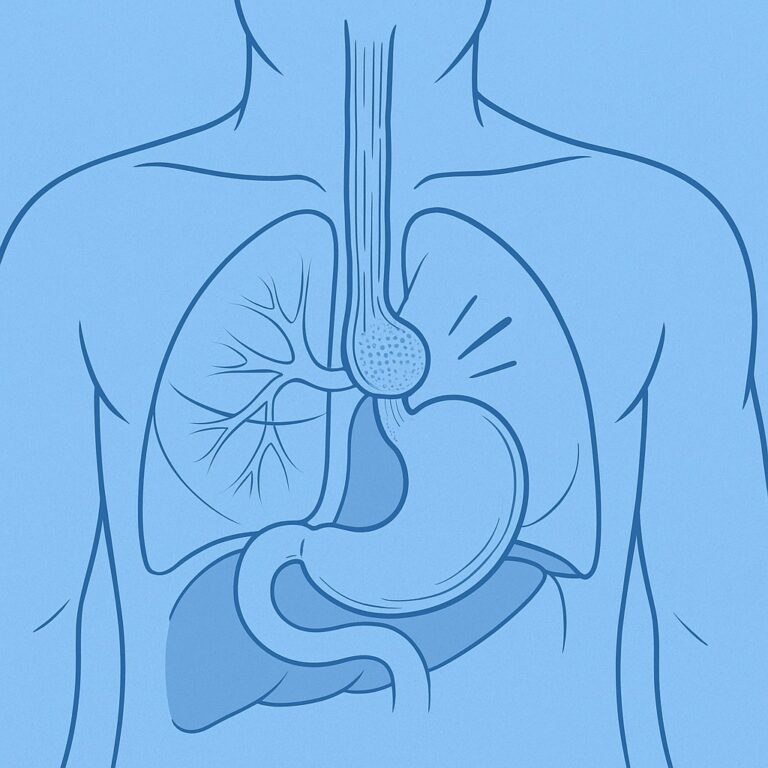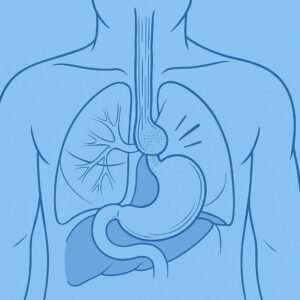Hiatus Hernia Treatment in Indore

Advanced Care by Dr. Pranav Mandovra – Specialist in Hernia Management
A hiatus hernia occurs when part of the stomach pushes up through the diaphragm into the chest cavity. While some cases may be asymptomatic, many patients experience symptoms like acid reflux, chest pain, difficulty swallowing, or frequent belching.

Common Symptoms of a Hiatus Hernia
- Heartburn or GERD (acid reflux)
- Chest discomfort or pain
- Difficulty swallowing (dysphagia)
- Regurgitation of food or liquids
- Chronic cough or throat irritation
When to Consult a Specialist
Persistent acid reflux or discomfort may be more than just indigestion—it could be a sign of a hiatus hernia. Early diagnosis and appropriate treatment are key to preventing complications such as ulceration or strangulation.
- Expertise in All Types of Hernias, Including Hiatus Hernia
- Advanced Diagnostic Tools for accurate assessment
- Laparoscopic Surgery Expertise – Minimal pain, faster recovery
- Compassionate, Patient-Centered Approach
Treatment Options
- Lifestyle & Medication Management (for minor cases)
- Laparoscopic Hiatus Hernia Repair
- Small incisions
- Minimal downtime
- Long-lasting relief from GERD and associated symptoms
Contact Us
Don’t let reflux or chest discomfort affect your quality of life. Get expert care today!
Contact Dr. Pranav Mandovra today to schedule a consultation and take the first step towards hernia treatment in Indore!.
Call to book Appointment: 87702 30725
Address: OPD No -510 , 5th Floor, Medicare Hospital & Research Centre, 4/5, Ravindra Nagar, Old Palasia, Indore, Madhya Pradesh 452001
Hiatus Hernia Treatment in Indore

Advanced Care by Dr. Pranav Mandovra – Specialist in Hernia Management
A hiatus hernia occurs when part of the stomach pushes up through the diaphragm into the chest cavity. While some cases may be asymptomatic, many patients experience symptoms like acid reflux, chest pain, difficulty swallowing, or frequent belching.

Common Symptoms of a Hiatus Hernia
- Heartburn or GERD (acid reflux)
- Chest discomfort or pain
- Difficulty swallowing (dysphagia)
- Regurgitation of food or liquids
- Chronic cough or throat irritation
When to Consult a Specialist
Persistent acid reflux or discomfort may be more than just indigestion—it could be a sign of a hiatus hernia. Early diagnosis and appropriate treatment are key to preventing complications such as ulceration or strangulation.
- Expertise in All Types of Hernias, Including Hiatus Hernia
- Advanced Diagnostic Tools for accurate assessment
- Laparoscopic Surgery Expertise – Minimal pain, faster recovery
- Compassionate, Patient-Centered Approach
Treatment Options
- Lifestyle & Medication Management (for minor cases)
- Laparoscopic Hiatus Hernia Repair
- Small incisions
- Minimal downtime
- Long-lasting relief from GERD and associated symptoms
Contact Us
Don’t let reflux or chest discomfort affect your quality of life. Get expert care today!
Contact Dr. Pranav Mandovra today to schedule a consultation and take the first step towards hernia treatment in Indore!.
Call to book Appointment: 87702 30725
Address: OPD No -510 , 5th Floor, Medicare Hospital & Research Centre, 4/5, Ravindra Nagar, Old Palasia, Indore, Madhya Pradesh 452001
